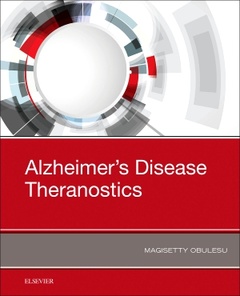Description
Alzheimer’s Disease Theranostics
Author: Obulesu Magisetty
Language: English
Subjects for Alzheimer’s Disease Theranostics:
80 p. · 19x23.3 cm · Paperback
Description
/li>Contents
/li>Readership
/li>Biography
/li>Comment
/li>
Alzheimer?s Disease Theranostics discusses the latest information on recent theranostic avenues for both the diagnosis and treatment of Alzheimer?s patients. It presents the pros and cons of the probable mechanistic role of nanoparticles in crossing the blood-brain barrier and improving disease symptoms. Finally, it highlights the merits of existing maneuvers and suggests perspectives to aid in future developments. Despite the difficulty of drug delivery to the brain, there are some nanoparticulate platforms demonstrating promise in treating neurodegenerative disorders such as Alzheimer?s disease. Manifold theranostic maneuvers include antioxidants, natural bioactive compounds, gene therapy, and nanotechnological approaches, all of which are discussed in this important work.
1. Introduction: Alzheimer’s Disease Pathology and Therapeutics2. Early Diagnosis of Alzheimer’s Disease: Pros and Cons3. Antioxidants in Alzheimer’s Therapy4. Natural Compounds in the Treatment of Alzheimer’s Disease5. Blood Brain Barrier6. Gene Therapy: The Cornerstone in the Development of Alzheimer’s Disease Therapeutics7. Viral vector therapeutics against Alzheimer’s Disease8. Mitochondria-Targeted Nanoparticles: A Milestone or a Mirage in the Treatment of Alzheimer’s Disease9. Nanoparticles: The Double-Edged Swords10. Alzheimer Therapeutics: Pros and Cons
Neuroscientists, biomedical researchers and graduate students, medical students
Materials science and biomaterials/biomedical engineering researchers/students, nutrition professionals
- Examines various theranostic applications for the diagnosis and treatment of Alzheimer’s disease
- Features a comprehensive overview of nanoparticle therapeutics in the area and use of antioxidants
- Assesses the common challenges and lessons learned from blood-brain barrier challenges, viral vector approaches and mitochondria-targeted therapeutics




